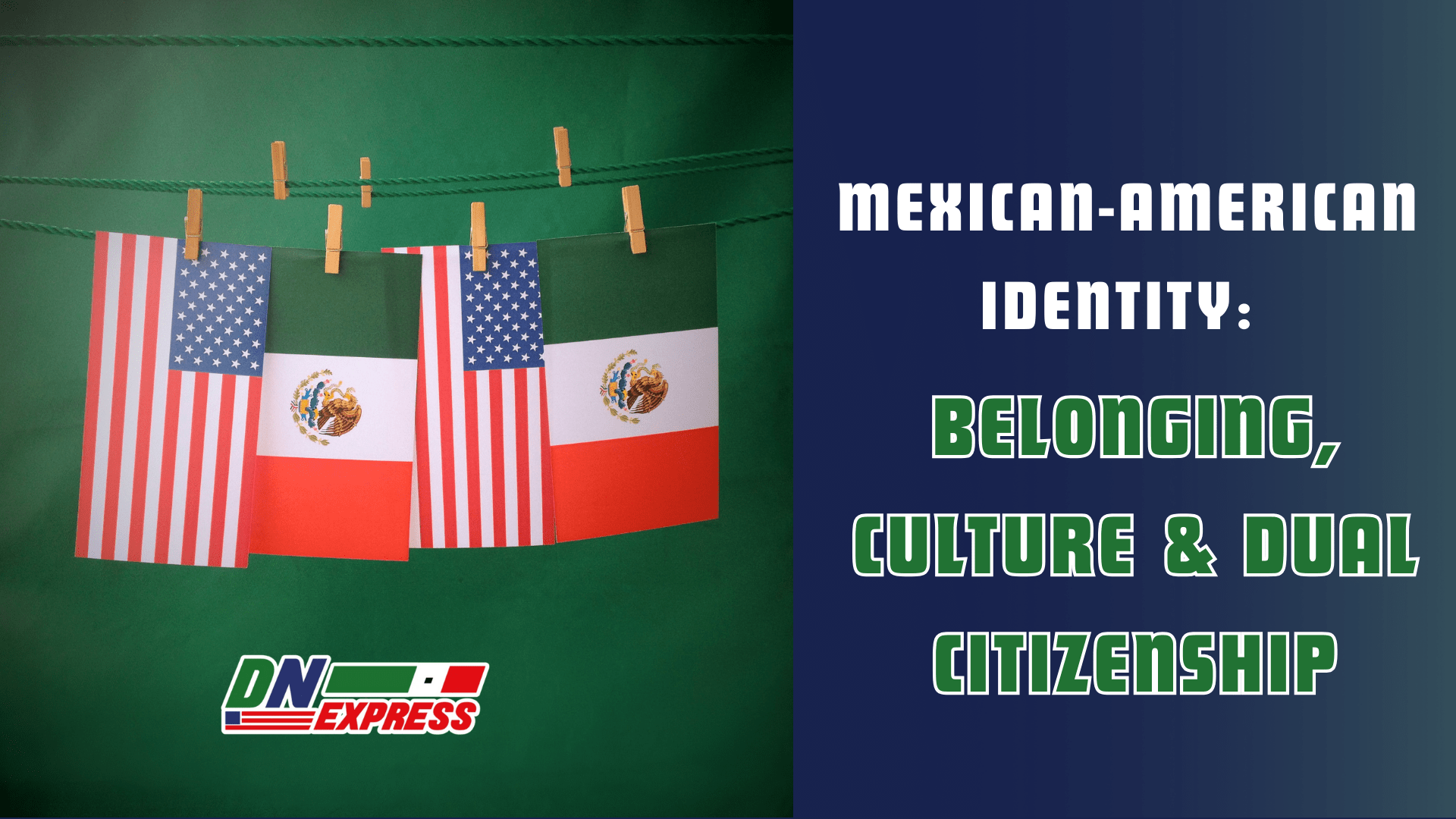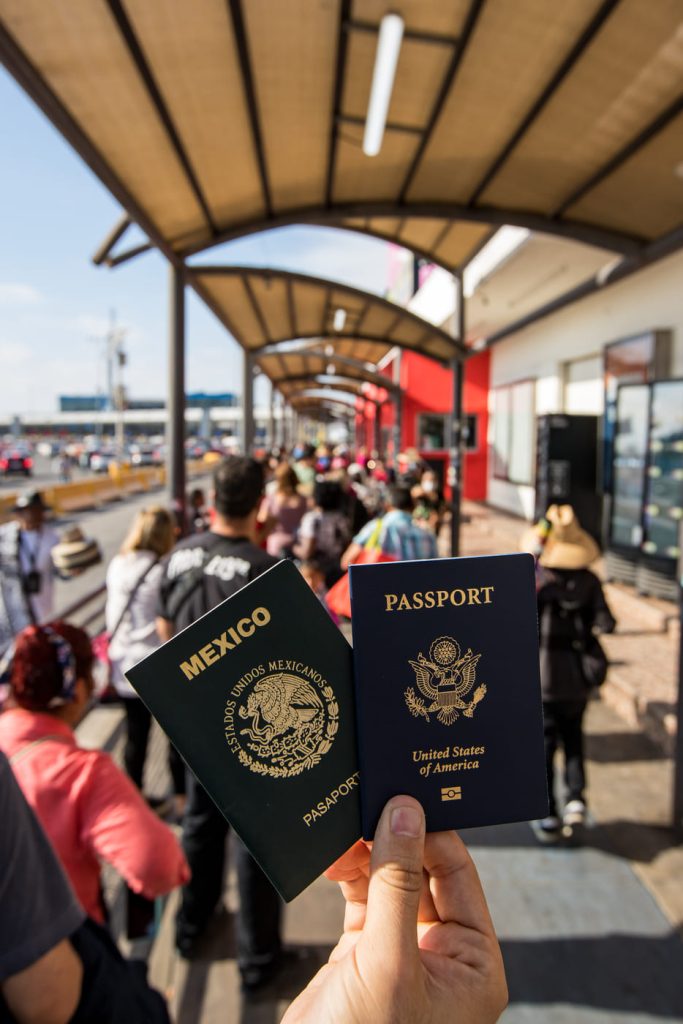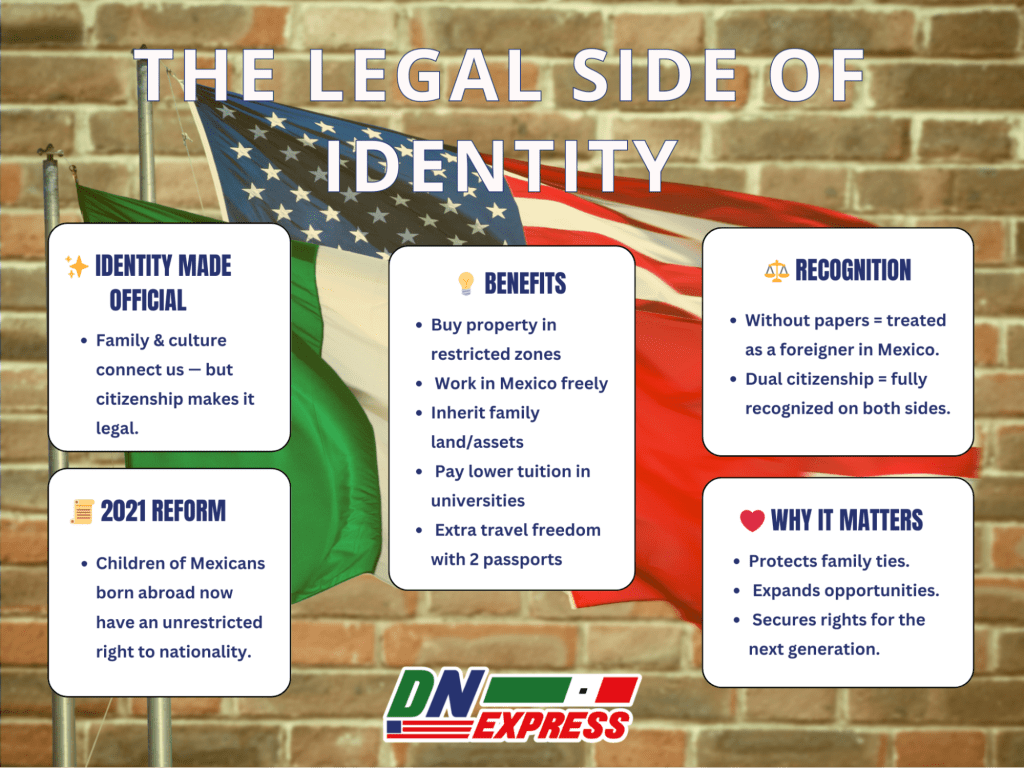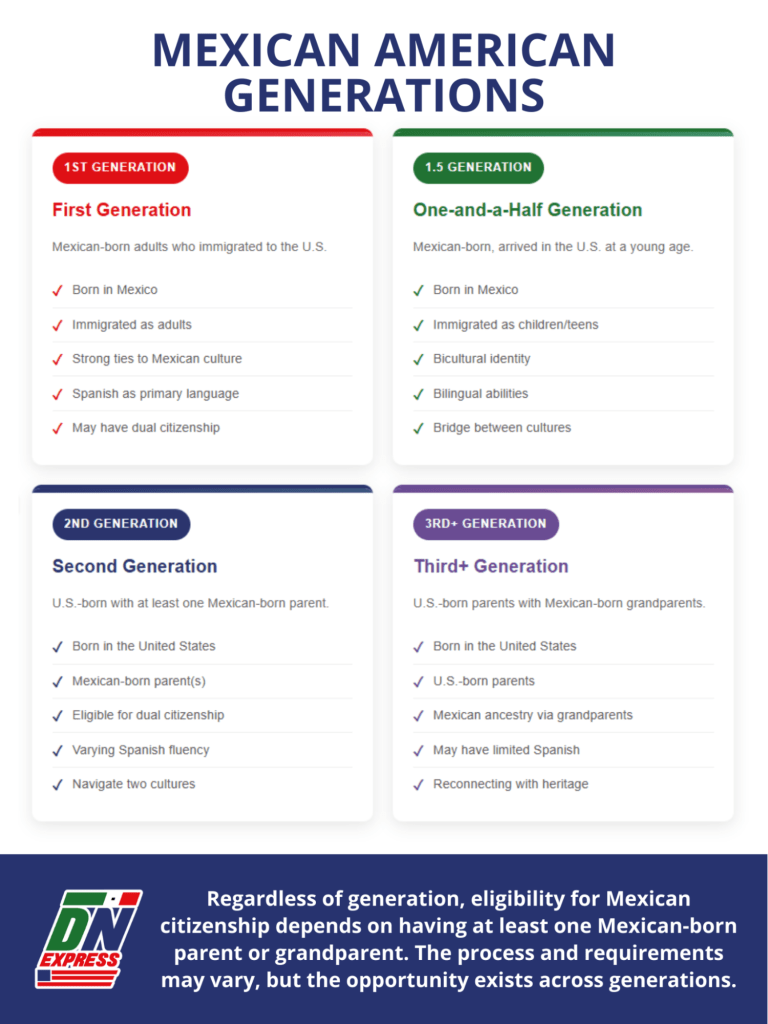
Being Mexican-American extends far beyond paperwork. It's about living in two worlds at once.
It's speaking English with friends and Spanish with abuelos, celebrating Día de la Independencia in September and the 4th of July in July. It means navigating the constant question: “Am I Mexican enough?”
At its heart, Mexican-American identity is about connection. Connection to family, traditions, and history.
For some, that connection is cultural. For others, it becomes official through dual citizenship.
Claiming Mexican nationality gives you rights, recognition, and the ability to pass that identity on to your children.
That's where we come in. We help thousands of U.S.-born Mexicans and their families secure their rightful nationality. No stress from consulates, long waits, or confusing rejections.
Our licensed attorneys make the process clear, fast, and affordable.
Here's what you need to know. But if you'd like the full breakdown, what Mexican-American identity means across different life situations, how people experience it, and how you can take legal action to secure your nationality, keep reading.
Daily Realities of Being Mexican-American
Living as a Mexican-American often means existing in-between. In the U.S., you may be seen as “not fully American.”
In Mexico, you may be treated as an outsider who left and doesn't quite belong. This dual rejection can weigh heavily, but it also shapes a unique resilience.
Language is one of the clearest battlegrounds. Many Mexican-Americans feel pressure to speak perfect Spanish, or risk being called “pocho” or “not Mexican enough.”
On the other hand, those who speak mostly Spanish can face mockery in U.S. settings. It becomes a constant balancing act.
This kind of gatekeeping, deciding who “counts” as Mexican based on fluency or birthplace, ignores the deeper truth. Identity goes beyond language.
It's about values, culture, and lineage.
At the same time, there's pride in the ability to hold two traditions at once. Families host carne asadas on the 4th of July while also honoring Día de la Independencia in September.
Mexican-Americans don't have to choose one or the other. They can celebrate both.
Reader worry addressed: “Am I Mexican-American if my Spanish lacks perfection?”
Yes. Your heritage doesn't disappear because of language skills.
Mexican-American identity encompasses family ties, traditions, and lived experience as much as it does fluency.

Identity Across Generations
Mexican-American identity changes with each generation. Research from the Pew Research Center shows that the more generations removed someone is from their family's immigrant roots, the less likely they are to identify with their ancestors' origins.
- First generation: For immigrants born in Mexico, the “Mexicano” identity remains strong. Spanish is dominant, traditions are deeply preserved, and the connection to Mexico is immediate and lived.
- Second and third generations: Identity becomes blended. Some embrace terms like Chicano or Latino to capture their U.S. upbringing alongside Mexican roots.
Others prefer to identify simply as “American,” reflecting deeper assimilation into U.S. life.
With each generation, families often worry: “Are we losing our traditions?” This concern has merit. Language, cultural practices, and even family ties to Mexico can fade.
But there are powerful ways to keep the connection alive:
- Formalizing nationality for children ensures legal and cultural recognition.
- Traveling to Mexico for holidays or family visits deepens roots.
- Bilingual education helps preserve language across generations.
Mexican-American identity doesn't require choosing one culture over the other. It's about carrying both forward and making sure the next generation has the tools to do the same.

The Legal Side of Identity: Why Citizenship Matters
For many, Mexican-American identity begins with family stories, traditions, and cultural pride. But when it comes to securing recognition on both sides of the border, citizenship makes identity official.
The Mexican government's 2021 constitutional reform now grants unrestricted right to transmit Mexican nationality to children of Mexicans born abroad, strengthening these connections across generations.
Formalized belonging
A Mexican birth certificate or passport goes beyond paperwork. It's proof that your heritage is recognized by law, not memory alone.
Recognition in Mexico
Without citizenship, U.S.-born Mexicans are often treated as foreigners, even when their parents or grandparents were born there. Dual nationality removes that barrier, ensuring you're not seen as solely American.
Practical benefits
Citizenship unlocks advantages:
- Property rights in restricted zones such as beaches.
- Work opportunities in Mexico without needing special permits.
- Inheritance rights to family land or assets.
- Education benefits, including lower tuition in Mexican universities.
- A second passport, expanding travel freedom.
Legal recognition ensures that your cultural identity carries weight wherever you go. It protects family ties, expands opportunities, and ensures the next generation has the same rights and recognition.

DIY vs Professional Help in Securing Citizenship
Many Mexican-Americans start their journey at the consulate, only to discover how complicated the process becomes. According to Pew Research data, over 37 million people of Mexican origin live in the United States, making citizenship services increasingly in demand.
DIY Pitfalls:
- Inconsistent rules between consulates can lead to rejections even if you brought the “right” paperwork.
- Name mismatches or small errors on birth certificates often derail applications.
- Families waste hours on long waits or traveling for appointments, only to be told to come back with different documents.
- For some, it means years of frustration and no progress.
Professional Advantage:
- Licensed Mexican attorneys know how to resolve document errors before they become roadblocks.
- Many services, like Doble Nacionalidad Express, can bypass consulate visits entirely by handling the process remotely.
- Cases are completed in weeks instead of months or years, with clear guidance every step of the way.
Trying to do it yourself can feel like running in circles. Working with professionals ensures your identity is recognized without unnecessary delays, stress, or wasted effort.
Why Choose Doble Nacionalidad Express?

When it comes to securing your Mexican citizenship, the difference between endless frustration and a smooth process often comes down to having the right team on your side. We make dual nationality simple, legal, and stress-free.
✅ No consulate visits, everything is handled remotely, so you skip the long waits and confusing requirements.
✅ Licensed Mexican attorneys, we don't file forms; we provide legal solutions.
✅ Affordable, transparent pricing, no hidden fees, clear upfront costs.
✅ Specialists in rejected cases, we turn past “no” into a definitive “yes.”
✅ Full bilingual support, stay updated through WhatsApp, phone calls, or email.
Client success story: “I thought I wasn't eligible because I don't talk to my dad. DNExpress found his records in Mexico and got me my nationality, no consent needed.”
With thousands of successful cases and a reputation for reliability, DNExpress goes beyond service. It's peace of mind.
Your heritage deserves to be recognized, and we're here to make sure it happens.
Take the Next Step

🌎 Reclaim your roots and secure your Mexican citizenship today.
📞 Schedule a Free Case Review or Message Us on WhatsApp to get started.
With DNExpress, the process is transparent, fast, attorney-led, and completely consulate-free.
Your identity deserves recognition on both sides of the border. Let our team handle the details so you can focus on celebrating who you are.
Questions People Ask About Mexican-American Identity
Mexican-American identity sparks many questions, both from those living it and those trying to understand it. Here are clear answers to the most common ones.
Research from institutions like the Smithsonian's exploration of Mexican America shows this centuries-old encounter between distinct communities that have coexisted and sometimes clashed over land, culture, and livelihood.
What is Mexican-American identity?
It's a dual cultural belonging, rooted in Mexican family heritage while shaped by U.S. upbringing. The National Museum of the American Latino recognizes this as part of the diverse Latino experience that has foundational roles in building the United States.
What classifies you as Mexican-American?
If you were born in the U.S. with Mexican parents or ancestors, you are Mexican-American. While citizenship can confirm it legally, culture, values, and lived experience also define it.
What ethnicity am I if I am Mexican-American?
You are considered Latino or Hispanic. Your nationality depends on your citizenship: U.S., Mexico, or both.
Can someone be Mexican and American?
Yes. Millions of people hold dual nationality legally, and culturally they live both identities side by side.
What are Mexican-American values?
Family loyalty, respect for elders, resilience, bilingualism, and traditions expressed through food, music, fiestas, and faith.
What do you call someone who is Mexican-American?
Common terms include Mexican-American, Chicano/a, Latino/a, or simply American. According to research on Hispanic identity preferences, the choice depends on personal preference and context.
What's the difference between a Mexican-American and Hispanic?
Mexican-American refers specifically to those with Mexican roots in the U.S. Hispanic is a broader umbrella covering all Spanish-speaking origins.
What is Mexican culture like?
It is rich in traditions, from mariachi and folklórico dance to religious festivals, strong family ties, and regional cuisines that tell centuries-old stories.
Am I Chicano or Mexican-American?
“Chicano” often implies a political or cultural identity tied to activism in the U.S., while “Mexican-American” is a broader, general identity.
Am I Hispanic if I am half Mexican?
Yes. Any Mexican ancestry places you within the Hispanic category, even if your other heritage is from a different background.
Need help with document translation or passport renewal? We provide comprehensive support for all your Mexican citizenship needs. For detailed answers to frequently asked questions, visit our FAQ section.



